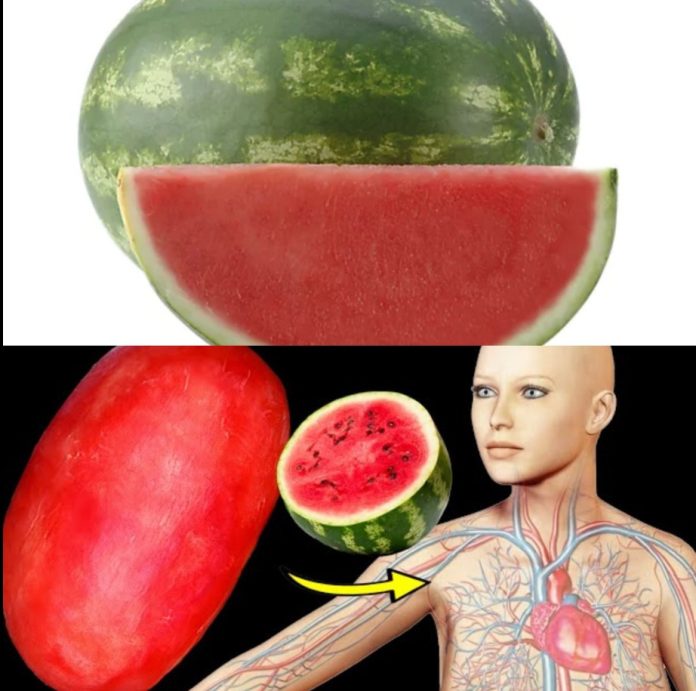Watermelon is more than just a staple of summer picnics—this juicy fruit is a powerhouse of nutrients that can transform your health. Known for its sweet taste and hydrating qualities, watermelon offers a range of benefits when included in your daily diet. From boosting hydration to enhancing skin health, eating watermelon every day can have profound effects on your well-being. Let’s dive into the numerous ways this delightful fruit can positively impact your body.
The Nutritional Profile of Watermelon
Before exploring the benefits, it’s important to understand what makes watermelon so nutritious. A typical serving of watermelon, about one cup, contains:
- Calories: Approximately 46
- Carbohydrates: 12 grams
- Fat: 0.2 grams
- Fiber: 0.6 grams
- Vitamins and Minerals: Rich in vitamins A, C, and B6, as well as potassium and magnesium.
Watermelon’s impressive nutritional profile makes it an excellent choice for promoting overall health.
1. Hydration and Electrolyte Balance
Watermelon’s high water content—about 92%—makes it an excellent choice for staying hydrated. Proper hydration is crucial for nearly every function in the body, including regulating body temperature, supporting metabolic processes, and maintaining electrolyte balance. In addition to its water content, watermelon contains potassium, an essential electrolyte that helps balance fluids and support nerve and muscle function. Eating watermelon daily can help replenish lost fluids and electrolytes, especially during hot weather or after strenuous exercise.
2. Antioxidant Benefits and Disease Prevention
Watermelon is packed with antioxidants, including lycopene and beta-carotene, which contribute to its vibrant red color. Lycopene is a powerful antioxidant known for its potential to combat oxidative stress and inflammation in the body. Research suggests that lycopene may help reduce the risk of certain chronic diseases, including heart disease and certain types of cancer.
Beta-carotene, another antioxidant in watermelon, is converted into vitamin A in the body. Vitamin A is vital for maintaining healthy vision, a strong immune system, and skin health. By eating watermelon daily, you can bolster your body’s defenses against free radicals and support overall health.
3. Digestive Health and Gut Wellness
Digestive health is another area where watermelon shines. The fruit’s fiber content, though modest, can help regulate bowel movements and prevent constipation. Watermelon also contains a compound called citrulline, which has been shown to have a mild diuretic effect. This can help flush out toxins and reduce bloating, contributing to a healthier digestive system.
Additionally, the high water content of watermelon aids in softening stool and maintaining proper hydration in the digestive tract, which is essential for smooth digestion and nutrient absorption.
4. Skin Health and Aging Prevention
The benefits of watermelon extend to your skin as well. The fruit’s high vitamin C content supports collagen production, which is crucial for maintaining skin elasticity and reducing the appearance of wrinkles. Collagen is a protein that helps keep the skin firm and youthful.
Lycopene in watermelon may also offer protection against UV radiation, which can help prevent sunburn and premature aging. Regular consumption of watermelon can contribute to a healthier complexion and a more youthful appearance.
5. Cardiovascular Support
Watermelon’s citrulline content provides cardiovascular benefits by promoting better blood flow and reducing blood pressure. Citrulline helps relax and dilate blood vessels, which can improve circulation and reduce the strain on the heart. Better blood flow can lower the risk of hypertension and support overall cardiovascular health.
Moreover, the fruit’s potassium content helps regulate blood pressure by counteracting the effects of sodium in the body. Consuming watermelon regularly can support heart health and reduce the risk of cardiovascular diseases.
6. Weight Management and Satiety
Watermelon’s low calorie and high water content make it an excellent choice for those looking to manage their weight. The fruit is naturally sweet, providing a healthier alternative to sugary snacks and desserts. Its high water content contributes to a feeling of fullness, which can help curb overeating and support weight management efforts.
Incorporating watermelon into your diet can satisfy sweet cravings while keeping calorie intake in check. The fruit’s natural sugars are balanced by its water content, making it a guilt-free treat.
7. Creative Ways to Enjoy Watermelon Daily
To make the most of watermelon’s health benefits, consider incorporating it into your daily diet in various ways:
- Fruit Salads: Combine watermelon with other fruits like berries, kiwi, and mint for a refreshing and nutritious salad.
- Smoothies: Blend watermelon with leafy greens, yogurt, and a touch of honey for a hydrating and flavorful smoothie.
- Chilled Soups: Try a chilled watermelon soup with cucumber and fresh herbs for a cooling summer appetizer.
- Frozen Treats: Make homemade watermelon popsicles or sorbet for a healthy and satisfying dessert.
- Savory Dishes: Incorporate watermelon into savory dishes, such as salads with feta cheese or grilled skewers, to add a touch of sweetness.
Conclusion :
Eating watermelon every day can offer a host of health benefits, from enhanced hydration and antioxidant protection to improved digestion and cardiovascular support. This refreshing fruit is not only delicious but also packed with nutrients that can contribute to your overall well-being. By making watermelon a regular part of your diet, you can enjoy its numerous health benefits while savoring its sweet and juicy flavor. So go ahead—slice up some watermelon and take advantage of its remarkable effects on your body!
Source of the picture : Barbara O’Neill










